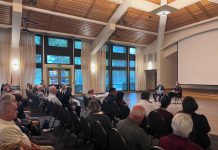A new pejorative sentiment has taken root and is flourishing in
Morgan Hill and its environs:
”
those people.
”
A new pejorative sentiment has taken root and is flourishing in Morgan Hill and its environs: “those people.” Applied to immigrants, who also are commonly referred to by other far more offensive names, this is just another term for the poor and illiterate foreign workers who are marginalized in our community. Their children and the manner in which they are prepared for school is a subject of speculation among parents of the Morgan Hill Unified School District.
Generalizations abound.
- The children of immigrants receive no or little help with assigned homework.
-
These kids are poorly dressed, have had less than minimal dental care and are not properly fed.
-
They are destined for gang membership and the drug culture.
-
The possibility that the non-immigrant children in the local schools will be corrupted and harmed is a perception held by their parents.
n The immigrant parents seldom appear and never volunteer at their children’s schools. This is attributed to laziness and/or indifference.
n These immigrants deliberately enter the USA to milk the welfare system, replace native born Americans in the job market and, regardless of opportunities offered by the community, refuse to learn English.
I am an English as a Second Language Family Literacy instructor and an active volunteer in the MHUSD and I needed to learn the truth about “those people.”
Are they truly disinterested in their children’s progress in school? Did they come to our country intending to get on the welfare rolls in order to maintain a substandard existence?
I learned of situations: victims of war; victims of drug lords raping and pillaging small villages; families murdered by local soldiers; and professions interrupted by the move to a foreign country. Many of my students were forced to discontinue their schooling in order to help provide food for their families. Many are mothers of multiple children because of a religion that forbids abortion and birth control methods.
The educated women among my students are limited by a lack of language skills from passing a licensing exam in this country.
They, like those from more humble backgrounds, came to this country seeking opportunities for themselves and, primarily, a positive future for their children. When asked if they would return to their native land, a few of my students said that they would consider going back, if it weren’t for their children. There is not much for them to return to because they gave up everything to make this move. They are stuck between two countries: one that doesn’t welcome them and another that would apply sanctions upon their return.
And these women work. As cleaning women, day laborers, in the fields and at less-than-minimum wage jobs with no benefits, they try to support their children.
It’s painful for them but they persist in their efforts to learn English so that their children will have a better life. Like mothers in every culture, they sacrifice and tolerate hardships for the sake of their children. Dealing with poverty, discrimination, isolation and bigotry is their lot, in order for their children to thrive.
The most degrading characteristic of the term, “those people,” is found in its failure to identify individuals.
They do have names: family names, baptismal names and secret names. Hard to pronounce for the everyday American, these names define who they are.
We cannot continue to diminish these immigrants and rationalize our discomfort from being near them and their kids.
The mothers and the children need help to transition into our language and culture.
Children want to learn. However, if they can’t read or understand the language, frustration occurs and misbehavior in the classroom is a predictable result.
The children we ignore are causing problems in school. Perhaps the solution is to volunteer in the local schools and just spend one hour helping them to learn English.
This is a better solution than blaming their parents for not helping with school work.
Think about it. Offer one hour a week and you may save a child from illiteracy – and from being a distraction for your own young ones. Remember the kids who go to bed without a story time.







